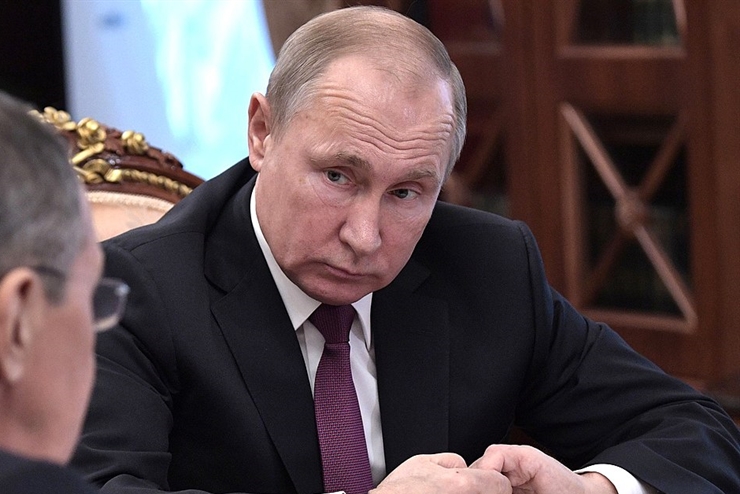President Vladimir Putin has been facing several crises that could undermine Russia’s strategic interests. His inability to respond quickly and effectively reflects lingering complacency within areas of Moscow’s sphere of influence.
Azerbaijan’s offensive against the Armenian enclave of Nagorno-Karabakh, encouraged and abetted by Turkey’s president Recep Tayyip Erdoğan, is testing Moscow’s ability to remain neutral in that conflict while maintaining its treaty obligation to defend Armenia proper. Turkey has thrown down the gauntlet, and Russia has yet to pick it up.
In Belarus, President Alexander Lukashenko is facing pressure from protesters who challenge his claim to victory in the presidential election. He has been subjected to sanctions from the European Union, which has not recognized the outcome, but relations between Moscow and Minsk nevertheless remain strained.
In early October another Russian partner in the former Soviet space, Kyrgyzstan, descended into mayhem after what appeared to be a classic, street-driven regime-change operation. As the same old scenario from Tbilisi, Kiev, Erevan, and Belgrade unfolded, Moscow remained aloof.
None of these challenges are existential per se. Cumulatively they have the capacity to erode even further Russia’s geopolitical position, which was badly undermined by the Ukrainian Maidan coup in early 2014 and its aftermath.
Just like six years ago, Putin’s response to the new challenges seems reactive. Retaining benevolent equidistance over Nagorno-Karabakh made sense while the conflict remained effectively frozen, with the recognition of Azerbaijan’s sovereignty tempered by the rejection of ethnic cleansing as an acceptable resolution.
Erdoğan upset the applecart, however, with his brazen incitement of the government in Baku, however. Azebaijan’s President Ilham Aliyev received assurances from Ankara that he could afford the risk, and so far the gamble has paid off. Turkey is acting as the patron of its ethnic and religious brethren, sending weapons, drones, and Syrian jihadists to bolster Aliyev’s forces. Russia, by contrast, has refrained from intervening.
Putin’s restraint, both after Turkey shot down a Russian fighter plane over Syria in 2015, and after the murder of Russia’s ambassador in Ankara, has not yielded dividends. To Erdoğan, moderation signals weakness and creates an opportunity to enhance the neo-Ottoman strategy that he has pursued for almost two decades. He is also at odds with Moscow in Libya and Syria, and may expect concessions from the Kremlin there in return for eventually restraining the Azeris.
Putin’s hesitation will signal weakness to others, including the rabid Russophobes in Washington, who are likely to play a major foreign policy role if Joe Biden is elected. The Biden campaign has already blamed Russia for “cynical” past weapons sales to both sides of the conflict.
In the medium term, a display of Russian weakness in the Caucasus may also be exploited by the Chinese in Central Asia, where the Kremlin has been losing ground for years. Chinese capital and technology boost the region’s prosperity and stability, which Russia can no longer provide by herself. Moscow’s north-south geopolitical vector in the direction of Iran and the Indian Ocean has been cut by the Chinese east-west thrust from Xinjiang to the Caspian Sea.
Moscow’s prevailing image of China as a future ally is unsurprising in view of Russia’s need to confront what it sees as geopolitical encroachment on its western and southern flanks. It does not fit in with China’s own calculus and long-term strategy, however. The imbalance in their commitment to a joint grand strategy reflects their growing asymmetry in terms of economic and military power. In the fullness of time, 1.4 billion Chinese may find Russia’s vast, effectively unpopulated, resource rich spaces between the Urals and the Pacific irresistibly alluring.
The manner in which Moscow still responds belatedly and reactively to many challenges, even in its immediate neighborhood, indicates the chronic lack of strategic vision. Abroad, Russia is not behaving like a superpower—it has stopped being one. At home, Putin has been unable to sort out the deficiencies of Russia’s economy, which is still dominated by corrupt oligarchs and globalists. He is a manager who balances divergent forces within Moscow, rather than a statesman.
Eventually the Russians may be forced to respond to ever-escalating provocations. The price of their current appeasement will be a radically reduced maneuvering space. There will be an exponentially greater danger of lethal escalation if and when the U.S.-led Drang nach Osten (drive to the East) is resumed in earnest. It is in the American interest, therefore, that Putin acts more like Churchill than Chamberlain, to make the danger of a major war less acute.
Image Credit:
above: Vladimir Putin, Sergei Lavrov and Sergei Shoigu (2019-02-02) [Image by: kremlin.ru, CC BY 4.0 , via Wikimedia Commons, cropped and resized]

Leave a Reply